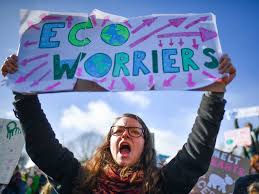Environmental change doesn’t only affect physical health, it also affects mental health.

There is an increasing acknowledgement that climate change affects not only a person’s physical health but also their mental health. Although there is little research on how it has a cognitive impact.
In 2021, psychotherapist and researcher, Caroline Hickman, a Bath University lecturer, and her colleagues studied data from 10,000 young people between the ages of 16 to 25, living in 10 different countries.
About half of those who took part in the test said they felt sad, anxious, helpless, and guilty about climate change.
Published in Lancet Planetary Health, the study shows that while the threats vary from food insecurity, and pollution, to flooding, the levels of anxiety are similar everywhere.
About half of them think that humanity will come to an end, 56% in the whole world, 51% in the United Kingdom, and 73% in the Philippines said Hickman. She believes that this emotional response is positive, as people should be more concerned about climate change. It is a healthy thing.
She warns that it is also important not to get overwhelmed by these feelings.

Source: Smithsonian Magazine
Lecturer in Social Anthropology at St Andrews University, Dr Bridget Breadely, is another academic who has been working with eco-anxiety research. She asks if this is a new mental health label, and how it can affect relations in the family.
Her small-scale study in 2021 showed that it wasn’t only young people who got affected mentally, older climate activists who struggled to make their children and grandchildren were also affected.
Her interest in eco-anxiety sparked when she gave birth to her son.
She said she was always aware of the environmental issues and their impacts but having a child made her realise how grave it was and she was overwhelmed with feelings in an intense way.
Jeniffer Newal left her academics and put her career on hold to take more direct action on climate change. She found that the scale of the problems she faced was overwhelming.
Jennifer is one of the rising numbers of people who face eco-anxiety. It presented itself in the form of depression and anxiety, she said talking about her experience. She said she can’t have children in this world because the world can’t cope and she would be extremely guilty to bring a child into a world like this, referring to the abysmal environmental problems.
She has accepted that the climate situation is going to worsen, and she has learnt not to wallow in personal guilt over it.
Eco anxiety is the chronic fear of despair, anger and hopelessness about the environment and climate change. A rising number of people have been noticing more stress about the environment.













